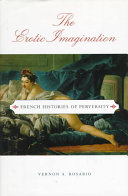
The erotic imagination. French histories of perversity PDF
244 Pages·1997·10.8763 MB·other
Most books are stored in the elastic cloud where traffic is expensive. For this reason, we have a limit on daily download.
Preview The erotic imagination. French histories of perversity
Description:
The Erotic Imagination Vernon A. Rosario "Degenerates are not always criminals, prostitutes, anarchists, or outright lunatics," the physician and journalist Max Nordau cautioned in 1893, "they are often writers and artists." Indeed, without writers and artists, medical experts in theeighteenth and nineteenth centuries would not have had much of the material on which they based their theories of sexual perversions. Thus it was that Rene Descartes could be diagnosed as a fetishist, because of his inordinate attraction to cross-eyed women, Gustave Flaubert as a hysteric, becauseof his hypersensitive imagination, and Emile Zola ("the novelist of the quivering nostrils") as an epileptoid degenerate, olfactory fetishist, and sexual psychopath, because of the suspicious richness of odors emanating from the pages of his books. Drawing upon the writings of literary figures such as Diderot, Rousseau, Zola, Flaubert, and Huysmans, and physicians and psychologists such as Tardieu, Binet, and Charcot, Vernon Rosario argues that the modern idea of the perverse first emerged in late 18th-century France and was shapedlargely by the strange confluence of medical writings, patient confessions, and literary narratives. Beginning with the shocking revelations of masturbation and masochism in Rousseau's Confessions, and the widespread public alarm over the "fatal convenience" of the "solitary vice," The EroticImagination illuminates precisely how various forms of eroticism came to be classified as perversions. Rosario takes the reader through a dizzying proliferation of "pathologies"--including the bizarre theories which enabled doctors to identify homosexuals, or "inverts," according to bodily stigmata,to the "uterine fury" of nymphomania, to an astonishing range of hysterias, fetishes, and erotomanias until finally only marital, reproductive sex survived as normal. Such "perversification" of sexual desire attempted to close off and regulate those erotic expressions seen as threatening
See more
The list of books you might like
Most books are stored in the elastic cloud where traffic is expensive. For this reason, we have a limit on daily download.
